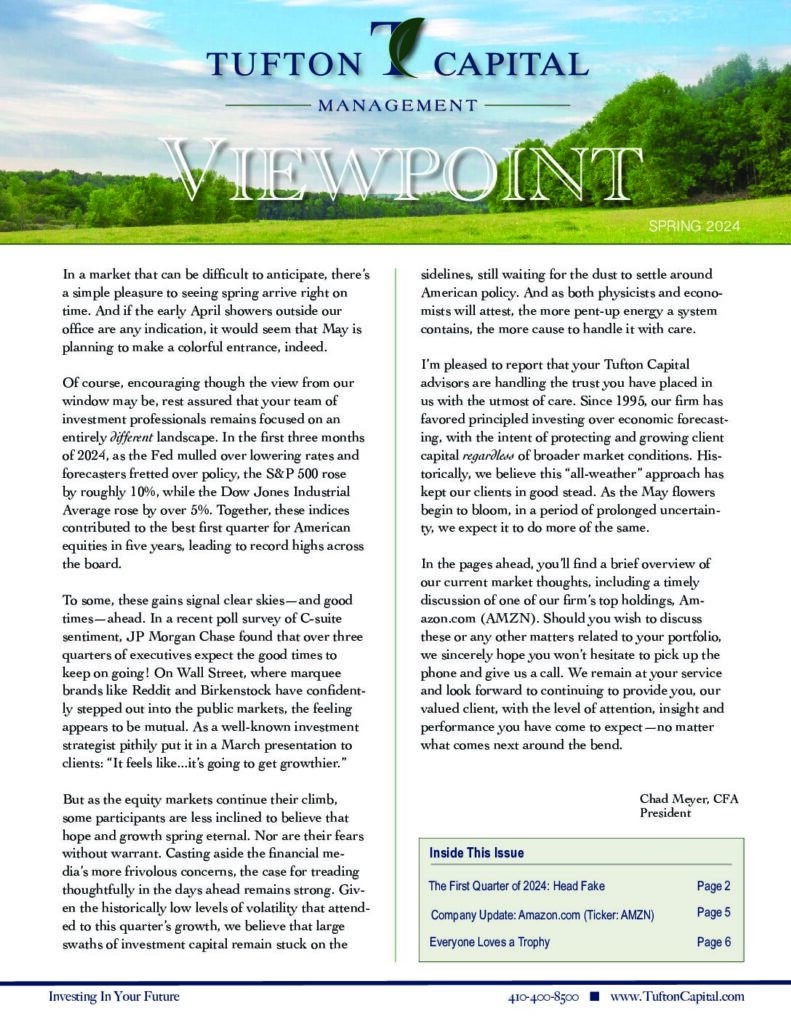The Tufton Viewpoint, Spring 2020
More so than ever before, the times in which we now live call for clarity of thought. As this letter “goes to press,” government officials are tasked with frankly weighing public health against economic strength; business leaders are struggling to responsibly balance the wellbeing of their employees with the newly-heightened challenges of remaining a going concern; and families the world over are called to remember, and to rally around, that which they truly hold dear. With the forces of history so plainly at work, there is scant use for distraction or spin.
To that end, let me be clear. January through March was a bad quarter in the stock market. After a banner finish to 2019, all of the market’s major indices made extraordinary retreats in the face of the COVID-19 pandemic, with the Dow Jones, S&P 500, and Nasdaq dropping 23%, 20% and 15%, respectively. Unsurprisingly, the records set by those figures are both disquieting and legion. In stark contrast to the last decade-plus of cocktail conversation, one is now apt to hear anxious talk of a “historically” bad market in which even inversely correlated assets such as gold succumbed to the equity market’s doom and gloom.
At an individual level, it’s tempting to do the same – particularly after a visit with the morning headlines. Whereas February’s Wall Street Journal fretted that the “coronavirus’s global spread may not be contained,” today’s media strikes a downright-dystopian note. Reading, for instance one of the New York Times’ latest harrowing lead stories, one might be so alarmed as to forget that bad news sells papers. But before you surrender to the notion that all is lost, I’d beg you to consider the following. As strange as it may seem, this is what we prepare for.
While I won’t profess to being tech-savvy, I bet a “text search” of the notes I’ve written in this space over the years would indicate an unusual reliance on two words – “value” and “disciplined.” In the sort of bull market to which we may now be bidding farewell, it can be hard to grasp what terms like that really mean. It is only in hard times – in the moments like this one – that the wisdom of these words shines through.
To be a “value” investor, one must adhere to the bedrock principle that an asset should not be purchased for more than it is worth, because in the long run excessive valuations always tumble back to earth. And to be a “disciplined” value investor, one must stick to that precept even when the market is deep into orbit, and terra firma is all but a distant memory. Here at Tufton Capital, we have proudly identified as “disciplined value investors” through a quarter-century of public markets – crests, crashes and public health crises included – on the belief that there is no more reliable way to safeguard our clients’ capital. Because we cannot know when heady prices will scurry back to fair value, we simply avoid heady prices in the first place.
Of course, that strategy can seem hopelessly antiquated when the sun is shining and all is well. But before you reach to pick up, and perhaps lament over, tomorrow’s paper, bear this in mind: Tufton Capital is, and always has been, ready for what lies ahead. Should America “re-open” in August, your trust is well-placed in us, and should it happen tomorrow, the story remains the same. As you focus on what matters most during these challenging times, take comfort in the fact that your team of investment professionals remains singularly committed and uniquely suited to furthering your interests during these turbulent days. From all of us at Tufton Capital, here’s to the continued health, wealth and happiness for you and yours.
Chad Meyer, CFA
President



